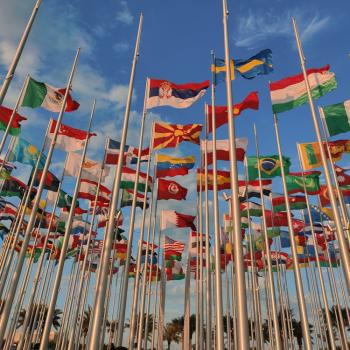
If I had my way, I would find myself staying away from politics and all the intrigue which comes from it, leaving it for someone else. For, by nature, I tend to be semi-hermitic, wanting to stay to mostly myself. I also know I can’t do that. I know that I have a responsibility to the world I live in. I am to help take care of it and preserve it for future generations. I am expected to be a good citizen, looking for and promoting the common good. I can’t do this if I don’t take politics seriously. If I gave into my temptation to simply retreat from the world, ignoring the responsibility I have for it, I might gain some level of peace, but it would be temporary and it would come at too great a cost. For, it is clear, there are many who pursue positions of power and authority for their own private good, and the more power they obtain, they more they will use it to circumvent the common good, causing great harm to the world. This is why I often write on political issues, not because I want to do so, not because it is something I love writing about, but because I take it as one way I can and should use my talents to work to make things better; similarly, I believe I (and anyone else) would be held culpable if I saw some great evil at work in the world and I said or did nothing to try to stop it.
I was raised in a conservative home, with very conservative ideals (that is, conservative as it is understood within the United States). I was raised to believe that principles mattered, and one must follow principles beyond political parties and agendas. My father was very conservative, but he was a principled man, constantly seeking after justice, helping those who he thought were being mistreated and abused. He believed in the rule of law, but he also believed law, and its execution, should be fair and equitable so that if he saw someone being unjustly treated by the law, politicians, the police, judges, or the press, he would add his voice to the resistance and he would use his legal expertise to help those in need. He would not be bought off, nor he would threats stop him from opposing injustices when he saw them. He believed in making things right, not in party politics. While my theological and philosophical studies often led me to disagree with some political beliefs my father had and raised me to have, this did not prevent him from representing something I aspired to be: someone who was honest and forthright, who did not allow himself to be taken in by people of power or wealth, but rather, someone who did what he believed was right, looking to help everyone as he did do. My father truly desired to help establish a better society, to have everyone’s dignity respected, even if he disagreed at times on the means by which that could or should be done.
It was when I became Catholic that I found my political beliefs and ideals change. The more I studied moral theology, the more I engaged Catholic social justice, the more I saw society and how it should be managed in a new way. I found that I had ignored, as many raised in evangelical homes ignored, many concerns found in Scripture and the greater Christian tradition, and when I finally acknowledged them and took them seriously, I changed my mind on many issues. Thus, I found I could no longer support the death penalty. I saw the need to protect the environment. I saw it was not only imperative to denounce racism, but to work to heal the damages systemic racism has caused. I saw that society must do better to take care of its poor, not treating them with contempt because of their poverty. I saw we are expected to be welcoming to others, to show love and mercy to those in need, be it my immediate neighbor, or my neighbor as they are found in the immigrant. It was not that I completely changed my mind on everything, but rather, I saw many of the beliefs I previously held to be woefully incomplete, that they did not engage as comprehensive or holistic engagement with the common good as is necessary. I saw, when many principles were ignored, that gave way for corruption, and through that corruption, much harm would be done to society and the world at large.
While Christians should not engage integralism, creating some sort of theocracy, or seek to have every moral teaching represented by positive law, their political engagement should include the basic principles established by their faith. That is, they should be pursuing the common good, doing so in such a way which promotes human dignity, and with that dignity, personal freedom. This is why many actions, while immoral, cannot be forbidden by the rule of law, for human freedom would be undermined.
Politics requires people to realistically consider the implications of their principles and how they can be practically applied, doing so in such a way that they can and will engage people with differing principles. That is, politics always requires compromise, which is not to say all compromise is acceptable, nor does it mean, people will need to compromise their own principles, but, for governing to be done, there will be some kind of compromise made by all so that the common good can be promoted. Christians should understand this, which is why they should understand why no candidate will represent everything they stand for. Promoting a candidate and supporting them for the good seen in them is not the same thing as supporting everything the candidate stands for. But, on the other hand, if the good promoted by a candidate is little, and the evil they would do, especially in regards society as a whole (and not in their own private lives) is great, then it would be improper to support them, as the little good which would be accomplished would be outweighed by the evil.
What is important for Christians is that they work for and promote the common good, and with that, look to the most serious concerns, such as the preferential option for the poor, the promotion of human dignity for all, and religious liberty, indeed, freedom, and use them as the foundation for their political engagement. If candidates speak against the common good, or worse, act against it, Christians need to take note. If candidates promote the rich and hurt the poor or the oppressed, if they attack innocent migrants and refugees, Christians need to take note. If candidates try to use some superficial elements of religious faith, acting like that makes them good and support religion, all the while making policies and promoting ideologies which run contrary to the religion they claim to follow, Christians, should take note, for they should understand religious liberty is not going to be preserved by someone who uses religion in such a fashion.
I take my faith seriously, and with it, the principles, the morals, which it has provided me. My father taught me to do so. It is because I do so, I speak out against Donald Trump, and what I find many Republicans want to do. They try to use the Christian faith as a tool for their own agenda. I am saddened at how many Christians I see who have been so easily led astray by the MAGA movement. I fear one of the reasons this has happened is that many, if not most, of the leaders of the Christian faith in the United States have not done a good job explaining the moral principles or expectations the Christian faith entails, or worse, have joined in with the far-right ideologies themselves. Christians might be told how and why various actions are sins, but they are not told how to properly gauge which sins are worse, and which among them should be dealt with society, and which should not. Indeed, we often find various moral teachings, such as those on sexuality, being discussed, making it appear they are far more important than they are, while those teachings which are based upon love of neighbor and what that love entails, are those most neglected. Because of this, many Christians are swayed by politicians who talk about sexuality and sexual morality more than they are about those who talk about the need to show love and concern for the poor, which is why Christians often end up promoting tyrants.
It is time for Christians to do better. It is time for them to reflect on the teachings of social justice found throughout Scripture (and the greater Christian tradition) and understand, due to their nature, they are the principles which must be considered when dealing with politics. It is time for Christians to take their political concerns seriously, not by trying to force others to be just like them, but by paving the way for the common good and the human dignity and freedom the common good will preserve.
*Personal Reflections And Speculations
Stay in touch! Like A Little Bit of Nothing on Facebook.
If you liked what you read, please consider sharing it with your friends and family!
N.B.: While I read comments to moderate them, I rarely respond to them. If I don’t respond to your comment directly, don’t assume I am unthankful for it. I appreciate it. But I want readers to feel free to ask questions, and hopefully, dialogue with each other. I have shared what I wanted to say, though some responses will get a brief reply by me, or, if I find it interesting and something I can engage fully, as the foundation for another post. I have had many posts inspired or improved upon thanks to my readers.












